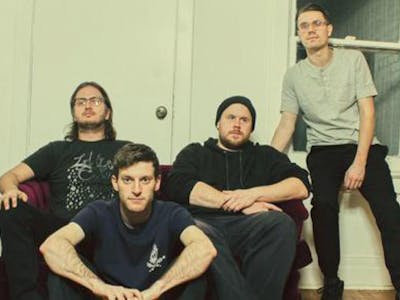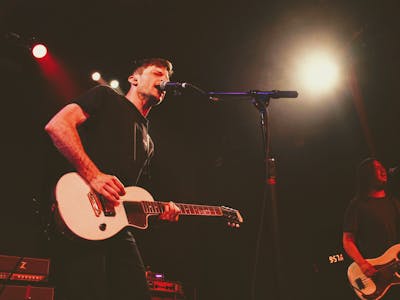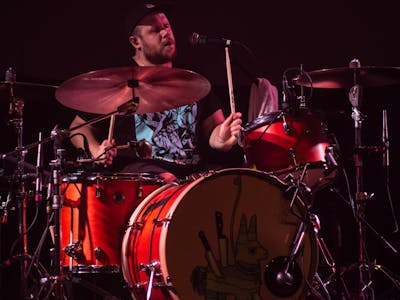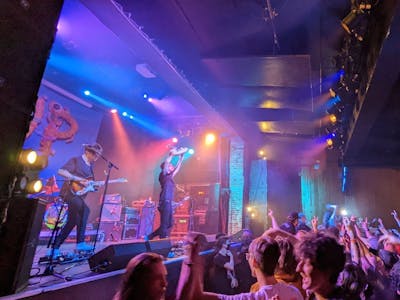In the midst of some big, scary, tense Earth-size moments, Canadian band Pup are having a moment of their own. Embracing the calamity, the struggle is most certainly real. Heady, brash, and thoroughly entertaining, they’re a band on the cusp of… something. The pieces are there. The work ethic is most certainly there. The talent and respect is there. But what comes next?
After two critically acclaimed albums filled with anthemic, emotionally fraught punk rock jaunts, this intelligent, hard-working four piece brings their unique vision of the world to bear on their third full-length, Morbid Stuff. Take Saves The Day’s seminal work Stay What You Are, shake it up with the snot-nosed indifference of Nofx, and throw it into a blender with healthy dose of self-awareness, and you kind ofget the idea.
Morbid Stuff is billed as a sort of hyper-aware catalog of depression, frustration, and anger; a monument to the fucked-up-ness of each and every one of us. Considering the state of the world today, the hard conversations we’re having almost hourly, the nigh unbearable weight of sadness and doubt and “Seriously, what next?” seems constant. The album, though, filters it all through a lens of “Yeah. So? What are you gonna do about it?” It never really answersthat question, but it finds a million different ways to make the listener think about what their answer might be.
Ahead of their arrival in Cincinnati, where they’re headlining at Bogarts on Wednesday, May 22, I found myself sitting in my car, windows up, digital recorder pressed close to the mic of my cell phone, excited by everything I was learning about the band, their new album, and exactly what they’re trying to accomplish. In my conversation with vocalist and guitarist Stefan Babcock, we touch on some of the sentiments above, and much, much more. He talks about what it was like to have the time to make an album like Morbid Stuff, how to maintain the longevity of a band who tours to live, and we dive into why an album like Morbid Stuff needs to, and does, exist at this precise moment in time.
This interview was slightly edited for clarity and length.
With your tour starting recently, it looks like you’re basically on the road through the end of November. How are you and the band mentally preparing for such a wide-ranging, both in length and locale, set of shows?
We’re about a week into the American dates, but we left home at the end of March, so we’ve been out for a while.
I don’t think there’s anything that you can do to prepare. I guess I just take comfort in the fact that this isn’t our first rodeo. We’ve done extremely long tours before and we’ve made it through. We just try to take care of ourselves, take care of our bodies, take care of one another, and do our best to make sure we know we’ll get through it.
We enjoy the experience, and we’re really luck to get to do it. So it’s important to not lose sight of how fun it is and lucky we are to do it.
As a band, you’ve been together for about 10 years and have managed some increasingly unique feats - not imploding, for one, or flaming out, but you’ve also retained your original lineup. How difficult has that been for you all?
We’ve been Pup for about 6 years I think, but we were a band before that called Topenga. So I guess I’ve been playing with these guys for, I wanna say, 7 years now? But, they’ve been playing together for like, 15 years, in various different bands. They’re childhood friends, and as much as I don’t feel like the newcomer anymore, I guess I am the newcomer.
I mean, it’s been really cool, and really fun for all of us to watch this project grow organically. We’re not one of those bands that exploded and had a bunch of success all at once. It’s been a slow kind of grind to where we are. There’s something really rewarding about that, about being able to come back to the same towns over and over again and see it grow by 50, 100, 200 every time we come back.
I’ve also played in a bunch of different bands, and I’m really lucky to find these guys because we’re all on the exactlythe same page, we all want the same thing out of this band, both musically and just in terms of our expectations. It’s pretty rare to find 4 people who are all completely on the same page. And that’s been the thing that’s kind of held this whole thing together.
So let’s talk about the new record. With Morbid Stuff you took more time and sort of devoted yourselves to making the process of its creation different than what you had done before. Can you talk a little bit about what you and the band took away from that experience?
I think there are two sides of this: One is that we wanted to do things a bit differently. We gave ourselves a lot more time, which we never have before. We’d just been recording between tours and kind of rushing things. So we wanted to give ourselves more time. But also, in a lot of ways, we kind of did things the same way that we had. We worked with the same producer, Dave Schiffman, as the last two records. It was just the five of us in the studio. It was the same studio we recorded The Dream is Over in, and I would say 80% of it was record live, off the floor. But I think we’re in a lucky position, to get to have that luxury of spending a bit more time in the studio.
On the last record, you know, it’s a record that we’re all extremely proud of, but it came together really fast. We were touring constantly. We had to be on the road pretty much nonstop in order to feed ourselves. So we were on the road constantly, and we had a three month gap between two tours and that was the time that we had to write and record the record. So, that’s not a lot of time.
But this time around, we had a bit more of a luxury to be able to take six months off, without starving. We were able to put together, I think, the best record that the four us, given the resources we had, it’s, I think the best record that the four of us could have made at this point in our lives.
Morbid Stuff is also a different sounding album than your previous two. It’s tighter, more focused, and dare I say more mature. Do you attribute that to the different process in writing or to something else?
I think a lot of that was also just the four of us becoming a better band. I mean, four years on the road, solid, will kind of - I don’t want to say changes the dynamic - but having played live so much, it feels like we’re much more comfortable as a unit, we trust each other more. I think that’s what the maturity is. It’s us getting better at being a band together.
For me, I’ve played in a bunch of bands before this one and I was never the main songwriter. So I’ve been kind of learning to be a songwriter since being in this band, and that’s also a learning curve. The first record, I really didn’t know what I was doing. I’m amazed that it turned out as well as it did. But I had no idea how to write a song. And the second record, I was sort of starting to get more comfortable. And I feel like on this record, myself as songwriter and the band as a full unit, we were striving and found our voice. It only took me fuckin’ 16 years to get it.
Whenever a younger musician asks me, “How did you do it?” It’s kind of like, “Well… I just didn’tgive up when I should have given up.” *laughs* Like, everybody else around me, all of the people that I played in bands with and friends that I had that played in bands tried really hard for six, seven years and it didn’t work and were like, “Well I’m in my 20’s, I should move on with my life,” and I just refused to. *laughs* So, slightly stupid, but, you know, I’m a persistent motherfucker. *laughs*
The album is sort of this… ode to sadness and frustration, but filtered through the lens of what I can only think to call a sort of humorous nihilism. Can you talk a little bit about having that perspective, especially in an environment or period of time, that’s so fraught with tension and emotion, especially when it comes to mental health?
*long pause*’ I mean, there’s so much to unpack there. I think that it’s great that people are having open, honest conversations about mental health. That’s a major step forward. The next step forward, I think, is to not fetishize it. As horrible as this is, as much as I wish that this wasn’t the case, but the next step forward is to kind of... normalize that experience. And just understand that it’s an experience that a ton of people, all over the world, through all walks of life, have experience with, and it shouldn’t be a thing that we fetishize.
I think that a lot of this record… I think looking back on it, and reflecting, it feels to me like the thing I can contribute is trying to normalize this experience. Making people aware that depression is just a thing that exists, and a lot of people deal with it. It doesn’t mean that you’re completely, a fucked up, sad, bummer of a person, it’s just means that this is a thing that a lot of people struggle with, and you know, hopefully, we can just accept that as a reality and figure out how we can all deal with it together.
One question I’m asking each band I talk to this year is - do you have a charity, or non-profit, or philanthropic organization that you want fans and readers to know about?
We’ve been working with local charities at every show. There’s an element to the local side of things that’s really important to us because, you know, we kind of roll into a city and we’re there for 12, maybe 24 - if we’re lucky - hours, and don’t really get a real sense of what’s going on in this community and how the people that are coming to our shows are affected by certain things.
So, on this tour we’ve made a really big effort for every show to partner with a local charity so that we can kind of get to know the communities that we’ve been going to for years and still know very little about, and get to know the struggles that the community around our band faces in their own towns. That’s been a really important thing for us.
There is a charity that we’ve been working with for many years, and have worked with a lot on this record, called The Trevor Project. They’re an American organization that helps LGBTQ youth who are struggling. They’ve been a fantastic organization - North America is lucky to have those people working hard for others who may not have as strong as a voice as we do. It’s fantastic.
Anything else you want to add or mention?
Thanks for doing this. It’s been a long time since we’ve played Cincinnati. We’re really looking forward to coming back!
Sincere thanks to Stefan for taking the time to chat, and to Nick for helping set everything up.
Pup arrives in Cincinnati with Ratboys and Casper Skulls this coming Wednesday, May 22, where they’re headlining Bogarts. Their third, and in my humble opinion, best album, Morbid Stuff, is out now on Rise Records and Little Dipper. Go to this show, buy this album. Seriously. You can even enter to win tickets courtesy CincyMusic right here.





